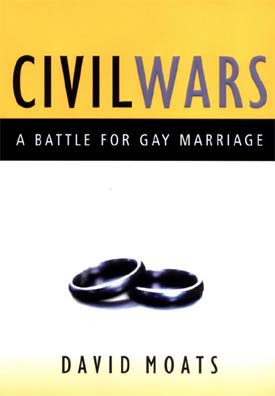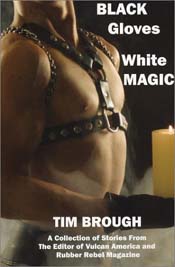
|
|
|
|
Civil Wars: Gay Marriage in America The Book Nook |
|
Civil Wars: Gay Marriage in America by David Moats; Harcourt; 288 pages; $25.00.  Civil Wars is not a history of "gay marriage in America," which only became a major national issue after this book went to press. Rather, it is a history of how the State of Vermont dealt with "gay marriage" in the wake of 1999's Baker decision and how Vermont enacted this country's first "civil unions" law as a politically-feasible alternative to same-sex marriage.
Civil Wars is not a history of "gay marriage in America," which only became a major national issue after this book went to press. Rather, it is a history of how the State of Vermont dealt with "gay marriage" in the wake of 1999's Baker decision and how Vermont enacted this country's first "civil unions" law as a politically-feasible alternative to same-sex marriage.
David Moats, who is himself heterosexual, won a Pulitzer Prize for a series of editorials that he wrote for the Rutland (Vermont) Chronicle, supporting civil unions. "I did not come to the issue as a gay man," Moats writes. "I came to it as a journalist discovering the most extraordinary story I had ever covered. I had gay and lesbian friends, of course, and, like anyone who manages to look beyond the distinctions of sexual orientation, I was able to see a truth that becomes increasingly plain as the curtains of bias are pulled aside. When love shows up, it does not always obey arbitrary social conventions. It is up to us to follow where it leads. If it is love, it will not be sinful, abusive, or otherwise wrong." At the outset, Moats asks the book's overriding question: How did such a thing happen in Vermont?" Moats is rightly proud of his home state, the first in the Union to abolish slavery and a center of progressive politics ever since. [The 18th Century French philosopher Montesquieu wrote that cold-weather states tend to be liberal and warm-weather states tend to be conservative. As far as the U.S. is concerned, Montesquieu was right.] But not even Vermont was ready for same-sex marriage, which is what it had to deal with on December 20, 1999. That day the Vermont Supreme Court, ruling on a case brought about by two lesbian and one gay male couple, ruled that Vermont was "constitutionally required to extend to same-sex couples the common benefits and protections that flow from marriage under Vermont law....Whether this ultimately takes the form of inclusion within the marriage laws themselves or a parallel 'domestic partnership' system or some equivalent statutory alternative, rests with the Legislature." To everyone's dismay, the court threw this boiling-hot potato into the laps of the State Legislature. Not surprisingly, most Vermont State Legislators - and Governor Howard Dean - did not care much for "gay marriage." Instead, the Legislators concocted a more acceptable alternative called "civil unions;" a format that would give same-sex couples the benefits of marriage without calling it that. Even so, Vermont's civil unions bill did not pass without a bitter fight, one that left both winners and losers bloodied and dissatisfied. As Moats admits in his book, "civil unions in Vermont did not represent victory for the freedom-to-marry movement. It was an important step but also a difficult compromise for those seeking the right to marry, and that battle has continued in other states." Civil Wars tells the tale of Vermont's civil unions law through the lives of the people who led the battle for and against the measure. As Moats put it, "the success of the struggle in Vermont depended on an extraordinary cast of characters, all of whom were essential to the final outcome. They included the six people who brought the lawsuit that was the catalyst for events, their dedicated legal team, the justices of the Vermont Supreme Court, the legislators, a governors, the archivists, and the ordinary people from all walks of life who recognized a claim to equality that could no longer be denied." The most interesting character in Civil Wars is Bill Lippert, the Democratic Representative from Hinesburg and the only out member of the Vermont Legislature. On the other hand, considering his political reputation, Governor Dean's role in the civil unions fight was minimal, and the book reflects it. But the real "hero" of Civil Wars is the Green Mountain State. In Moat's opinion, "the Vermont story ranks, not just with the Stonewall riots and the murder of Harvey Milk as landmarks of gay history, but with Birmingham and Selma as landmarks of our growth toward a more complete democracy." Though I wouldn't go that far, there is no question that the enactment of civil unions in Vermont was an important part of America's ongoing culture war over same-sex marriage. Though obviously biased, Moats tries his best to give both sides their due - and plenty of quotes. In the end, Moats wrote a book that, all in all, is surely the essential study of civil unions in Vermont. Future historians, who will someday write about how the United States of America finally came about to accept same-sex marriage as an inalienable right, will use Moats's book as an important and valuable resource. My Favorite Book:
|
|
 "My favorite book," according to my friend Mauro Montoya, author of Livin' In Leather, is Black Gloves, White Magic by Tim Brough [ Nasca Plains Corporation, 2003]. "The stories are not your typical sex stories; each involves a particular kink. My favorites are the forest ranger stories and one entitled "Blaine," in which the narrator is a submissive being tortured by his some-time Master all the while having an intellectual discussion about submission. The book explores fetishes from sneakers to rubber and each story is both erotically and intellectually stimulating, most having some type of discussion of Master/slave, Daddy/boy or Dom/sub relationships." If you have a favorite book to share, e-mail the title and the author; a sentence or two explaining why you like that book so much; and a name that we can use to
"My favorite book," according to my friend Mauro Montoya, author of Livin' In Leather, is Black Gloves, White Magic by Tim Brough [ Nasca Plains Corporation, 2003]. "The stories are not your typical sex stories; each involves a particular kink. My favorites are the forest ranger stories and one entitled "Blaine," in which the narrator is a submissive being tortured by his some-time Master all the while having an intellectual discussion about submission. The book explores fetishes from sneakers to rubber and each story is both erotically and intellectually stimulating, most having some type of discussion of Master/slave, Daddy/boy or Dom/sub relationships." If you have a favorite book to share, e-mail the title and the author; a sentence or two explaining why you like that book so much; and a name that we can use to  Jesse Monteagudo is a freelance writer and gay book lover who began his collection with a copy of The Gay Crusaders, by Kay Tobin and Randy Wicker, back in 1972. Write to him at
Jesse Monteagudo is a freelance writer and gay book lover who began his collection with a copy of The Gay Crusaders, by Kay Tobin and Randy Wicker, back in 1972. Write to him at